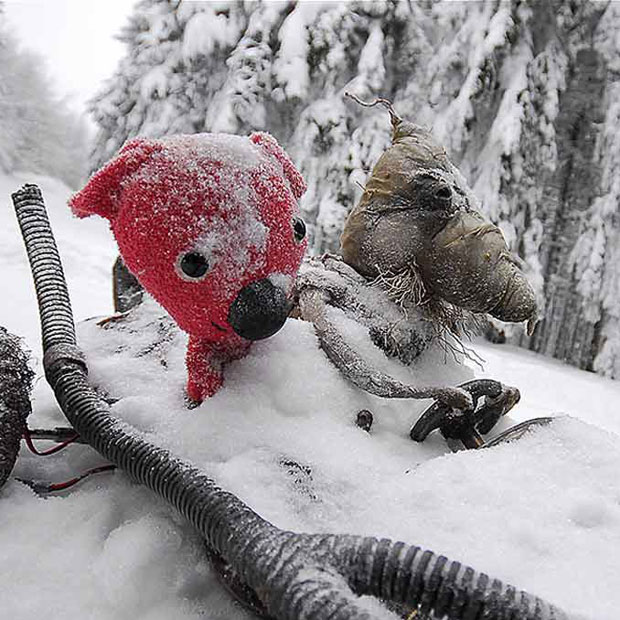The Latest from Boing Boing |  |
- Blink tag considered harmful
- How ACTA will change the world's internet laws
- Draconian UK Digital Economy Bill passes: huge blow for digital privacy, security, freedom
- Leonard Maltin's 151 Best Movies You've Never Seen
- Earliest known Led Zeppelin recording
- A multicellular organism that lives without oxygen
- Predicting earthquakes with radon gas
- Evolutionary Psychology Bingo
- Kooky's Return: Machinarium, Samorost designer turns to film
- Dead man denied seat on plane
- James Taylor & Carole King "intimate" arena shows
- Russian board games from the 1920s and 1930s
- Lesbian panic victim invited to Potemkin Prom?
- Science Question from a Toddler: Life before birth
- HOWTO make an iPad that respects freedom
- Underwater Jules Verne world in Second Life
| Posted: 08 Apr 2010 05:20 AM PDT : The specific flaw exists due to a failure to unregister a callback pointer during the destruction of a particular type of element when embedded inside a 'blink' container. The application dereferences the original resource which can can be leveraged by an attacker to execute arbitrary code under the context of the current user.Apple Webkit Blink Event Dangling Pointer Remote Code Execution Vulnerability Previously: |
| How ACTA will change the world's internet laws Posted: 08 Apr 2010 05:18 AM PDT Since the text of the Anti-Counterfeiting Trade Agreement (a secret copyright treaty being negotiated by a members' club of rich countries, out of sight of the United Nations) leaked, scholars and public interest groups have been poring over its clauses. Here are two alarming pieces of research explaining just how bad this really is: First, Knowledge Ecology International analyzes the Provisions on Injunctions and Damages. They conclude that ACTA goes way, way beyond the TRIPS (the copyright/patent/trademark stuff in the World Trade Organization agreement), creating an entirely new realm of liability for people who provide services on the net. Since liability for service-providers determines what kind of services we get, increasing their liability for copyright infringement will make it harder to invent new tools like web-lockers, online video-hosting services, blogging services, and anything else that's capable of being used to infringe copyright. This matters because various governments, including the EU, Canada, and the USA, have argued that there is nothing in ACTA that will change domestic law -- that it's just a way of forcing everyone else to adopt their own laws. What we see here, though, is a radical rewriting of the world's Internet laws, taking place in secret, without public input. Public input? Hell, even Members of Parliament and Congressmembers don't get a say in this. The Obama administration's trade rep says that the US will sign onto ACTA without Congressional debate, under an administrative decree. Next is Public Knowledge's Sherwin Sly, with a broad look at what ACTA says and what it means: But the potential effects of ACTA go beyond merely nudging interpretations of U.S. law in a new direction. Acceding to a new international agreement would hamper attempts to amend some of the flaws in our current law, locking us into a system that already has apparent flaws. ACTA's effects on the laws of other countries should also be taken into account, as we want to ensure that IP laws don't unduly hamper the free speech of other countries' citizens, or, to take a more commercial tack, that IP laws don't subject US technology companies, like the makers of digital recording devices or hosting websites, to overbroad copyright liability. (via Michael Geist) Previously:
|
| Draconian UK Digital Economy Bill passes: huge blow for digital privacy, security, freedom Posted: 07 Apr 2010 09:16 PM PDT The Digital Economy bill, known on Twitter as #debill, passed today. The short version is that this thing makes the DMCA look like a warmup act. Cory's traveling, but you can expect his thoughts here soon. For now, Mike Butcher sums up the danger eloquently: During the 1960s Chairman Mao told farmers to kill crop-eating sparrows, an edict which produced a plague of the insects which the sparrows normally ate. Likewise, the Digital Economy Bill, in trying to support artists' copyright and tackle illegal file-sharing, is about to produce a new culture - in which ISPs and bewildered householders are deluged with threatening legal letters from the entertainment industry.This matters for America and other countries, too. There is now a precedent of a partner nation disconnecting users for alleged copyright infringement. This is a terrible moment for internet privacy and freedom. |
| Leonard Maltin's 151 Best Movies You've Never Seen Posted: 07 Apr 2010 08:07 PM PDT  I generally agree with Leonard Maltin's movie reviews. He's a fan of ukuleles and old cartoons, too, which makes him A-OK in my book. I generally agree with Leonard Maltin's movie reviews. He's a fan of ukuleles and old cartoons, too, which makes him A-OK in my book. So I am going to add every one of his picks from 151 Best Movies You've Never Seen to my Netflix queue, even the ones I've already seen. Fussy sourpusses will complain about the title, but I have only seen a handful of the movies Maltin recommends: Better Than Sex, Disney's Teacher's Pet, Idiocracy, and Zathura. And I liked those four movies a lot. That leaves 147 titles I have yet to see. If you are familiar with Maltin's writing, you'll know his writing is accessible and informative. The reviews in 151 Best Movies You've Never Seen are like that. They're one to two pages long, and provide just enough of the plot to get you interested without spoiling anything. (I can't believe I never saw The Lookout, or even heard about it until I got this book.) |
| Earliest known Led Zeppelin recording Posted: 07 Apr 2010 06:07 PM PDT Behold, the earliest known Led Zeppelin recording. Part of a December 1968 show that took place three weeks before the band's Led Zeppelin album came out, this version of "Dazed and Confused" is part of a full-show bootleg that's been available to fans for awhile. This is just its first time on YouTube. Apparently, when this was recorded, Led Zeppelin was so obscure that they were listed as "Len Zefflin" on ads for the show. Enjoy! (Thanks, Ms. Paige Worthy!) Previously: |
| A multicellular organism that lives without oxygen Posted: 07 Apr 2010 05:49 PM PDT  You're looking at the first multi-cellular, anaerobic organism known to humans. Anaerobic, of course, means this little critter lives entirely without oxygen. We've long known that single-celled organisms could live this way, but this discovery comes as a bit of surprise. Even more fascinating (to me, at least) is the fact that this organism, part of a species called Loricifera, has no mitochondria. I didn't realize this, but anaerobic organisms have an entirely different organelle, called hydrogenosomes, that power their cells. I'm not sure whether hydrogenosomes have the same sort of origin story as mitochondria—i.e., separate organisms that took up residence in a host cell and became part of its machinery—but that's the first thing I'm researching tonight when I get a chance. |
| Predicting earthquakes with radon gas Posted: 07 Apr 2010 03:47 PM PDT Radon gas may leak out of fault lines in greater quantities prior to an earthquake. In 2009, an Italian man claimed to have used radon monitors to predict a quake near his hometown of L'Aquila. Success with the radon approach has been—like all attempts at predicting quakes—rather hit and miss. But a physics Nobel laureate hopes to change that with a new, improved radon detector that easier to use in the field. |
| Posted: 07 Apr 2010 02:48 PM PDT |
| Kooky's Return: Machinarium, Samorost designer turns to film Posted: 07 Apr 2010 12:54 PM PDT  For the past seven years, Czech creator Jakub 'Amanita' Dvorský has been behind some of indie/adventure gaming's most striking designs, most recently and notably with his rust-washed pen-and-ink point & click Machinarium (featured here on Boing Boing several months back). There's typically a too-long pregnant pause after each of his games is completed where we wait to hear where he's going to take us next, but his latest answer comes sooner than later and is a surprising one, as he announces that he's turning his attention instead to film. For the past seven years, Czech creator Jakub 'Amanita' Dvorský has been behind some of indie/adventure gaming's most striking designs, most recently and notably with his rust-washed pen-and-ink point & click Machinarium (featured here on Boing Boing several months back). There's typically a too-long pregnant pause after each of his games is completed where we wait to hear where he's going to take us next, but his latest answer comes sooner than later and is a surprising one, as he announces that he's turning his attention instead to film. Directed by the BAFTA nominated Jan Sverák and due for release later this year, Kooky's Return sees Dvorský handling character and puppet design for the "real life experience" of the movie's eponymous teddy bear protagonist. While it might seem an unexpected turn for the designer, watching the trailer above -- newly translated into English -- shows off exactly the same sensibilities he made his signature with his debut Samorost adventures: twisted, dirty, but basically adorable characters in a broke-down, rusted and gnarled woodland world. Alongside the trailer update, the film's official English site has just opened, where you'll find more information, making-of photos, and some of Dvorský's hand drawn character art -- all we need now is a date for an eventual stateside festival debut. Previously: |
| Posted: 07 Apr 2010 11:22 AM PDT Gitta Jarant and Anke Anusic were arrested after attempting to check in Curt Willi Jarant, 91, on a flight from Liverpool to Berlin. Turns out, Jarant was dead. Gitta Jarant, the man's widow, and Anusic, his stepdaughter, claim that they thought he was alive but sleeping. The two are suspected of "failing to give notification of death" and are out on bail. I am unsure if the photo, accompanying a BBC News article, depicts Jarant before or after he died. From the BBC News: "Women try to take body on plane at Liverpool airport" |
| James Taylor & Carole King "intimate" arena shows Posted: 07 Apr 2010 10:36 AM PDT   I admit it. Hell, I'm proud of it. I have a thing for the best singer/songwriters to come out of the 1960s and 1970s -- Dylan, Baez, Leonard Cohen, Cat Stevens, and of course James Taylor and Carole King. In 1970, the year I was born, Taylor and King performed a series of what are now recognized as groundbreaking concerts at The Troubadour club in Los Angeles. King, mostly known for tunes she wrote for other artists, was Taylor's opening act. During a soundcheck at the Troubadour, Taylor heard King play "You've Got A Friend" on the piano, and asked her to perform it with him that night. Those Troubadour shows became legendary gigs in the history of rock. When celebrating the 50th anniversary of The Troubadour in 2007, Taylor said, "I played here a number of times in the 70s, allegedly..." This year, King and Taylor are taking a Troubadour reunion show on the road. Sadly, they won't be playing in small clubs this time around, but for 120 folks with a lot of extra cash (A LOT), it'll feel a bit like they were. Above is the stage design for the concerts. VIP ticket holders will sit at cocktail tables surrounding the center stage. Of course, if you turn around you'll see tens of thousands of other fans behind you. But it shouldn't be that hard to suspend your disbelief for a couple hours. Proceeds from the VIP ticket packages, which include soundcheck, a reception, and various souvenirs, will go to charities like Natural Resources Defense Council, Alliance for the Wild Rockies, and dozens of others you can pick from when you pay. Taylor and King expect to raise more than $1 million from sales of just those cocktail table seats, which are going for between $800 and $1200, depending on the city. I hope to be at one of the shows. If you are too, and happen to be in one of the VIP seats, please be sure to say hi. Just turn around and wave. James Taylor & Carole King Troubadour Reunion Tour VIP Packages James Taylor Carole King |
| Russian board games from the 1920s and 1930s Posted: 07 Apr 2010 09:14 AM PDT |
| Lesbian panic victim invited to Potemkin Prom? Posted: 07 Apr 2010 07:24 AM PDT  Remember Constance McMillen, the teenaged lesbian whose impending attendance at high school prom led school administrators to cancel it for everyone? The ACLU sued them and won, but it looks like the locals in Itawamba County, Miss., had a plan to end-run the ruling. They organized a private prom and invited her, but it turned out to be a fake: only a handful of students were in attendance. The real prom, to which everyone else was secretly invited, was arranged and held elsewhere. Neal Broverman of The Advocate quotes her: "They had two proms and I was only invited to one of them. The one that I went to had seven people there." Remember Constance McMillen, the teenaged lesbian whose impending attendance at high school prom led school administrators to cancel it for everyone? The ACLU sued them and won, but it looks like the locals in Itawamba County, Miss., had a plan to end-run the ruling. They organized a private prom and invited her, but it turned out to be a fake: only a handful of students were in attendance. The real prom, to which everyone else was secretly invited, was arranged and held elsewhere. Neal Broverman of The Advocate quotes her: "They had two proms and I was only invited to one of them. The one that I went to had seven people there." |
| Science Question from a Toddler: Life before birth Posted: 07 Apr 2010 08:34 AM PDT  "Hello baby, is it dark in there?" Like reader jackie31337, who asked this question when she was a small child, scientists don't remember what life in the womb was like. If they want to know what a fetus can see—not to mention smell, hear, taste and touch—they have to go right to the source. Unfortunately, the unborn are not the world's greatest communicators. To find the answers, researchers study animal fetuses, healthy human newborns only hours old and premature infants finishing their pre-natal development in an incubator. What they've learned about the fetal experience and the development of the senses not only expands our understanding of the human body, it's also helping to up the premies' chances for a healthy, normal life. Across the animal kingdom, senses come online in a very specific order that doesn't vary much from one vertebrate to another. The first sense fetuses experience is touch. Then come the chemical-based senses—taste and smell. The ability to hear develops fourth. And finally, so late that many animals are born lacking it, comes sight. Humans, with our relatively long gestation periods, are one of the few species that can see before we're born. Not that there's very much to see. The short answer to jackie31337's question is, "Yes. It is, in fact, rather dark in there."
Scientists have watched fetuses on ultrasound turn their heads away from bright lights held up to their mother's stomach, Fifer said. And they've seen the brain waves of premature infants spike in response to a flash of light, or a change in visual stimulus—switching a card from vertical stripes to horizontal, for instance. Sight isn't much of a sense at this point, but it's enough. Enough for what? That's where things get interesting. See, senses don't work via some neurological "off/on" switch. It's more like building muscle. You have to exercise to get results. The more you work out the new sense, the more neuron connections are formed and the sense improves. But if you don't use it, you lose it. Literally.
Sensory stimulation is important in other ways as well, helping fetuses learn. For instance, duck embryos peep to themselves while still inside their eggs. As they do that, they begin to recognize what a duck voice sounds like.
Monkey hear, monkey do Human fetuses use their senses to learn, too. Christine Moon, Ph.D., professor of psychology at Pacific Lutheran University, studies auditory development in humans. She does her research by staking out the maternity wing at a local hospital, popping in on new families right after babies are born. If the parents are interested, infants as young as eight hours old can be tested to see how they respond to different sounds. The babies wear headphones and are given special pacifiers hooked up to a computer.
Turns out, babies suck harder on the pacifiers when they hear sounds that are familiar to them from before birth. Newborns prefer their mother's voice over anyone else's (even dad's). They prefer hearing phrases from books they were read while in the womb, compared to new stories. They're even already favoring one language over another.
Mothers' speech seem to matter in other ways as well. Moms who don't mumble or slur their words together have children that can better recognize consonants at 6-to-8 months, and have bigger vocabularies at 10-to-12 months, compared to their peers. This, and other research, has led Moon to theorize that language acquisition is a process that begins before we're even born. Seeing a better future All this has big implications for infant health. We know now that sensory experiences before birth play a role in making sure senses develop properly and that fetuses learn important post-birth behaviors. That's helped researchers better understand what happens to fetuses exposed to alcohol. Too much alcohol makes for a fetus that doesn't move around much and interacts less with its environment. That means less sensory experience and, thus, less cognitive development. Like the de-vocalized duck embryo, a fetus exposed to alcohol can't teach itself. That sensory deprivation can even have physical impacts.
Studying fetal senses has also helped doctors develop better ways of caring for premature infants. These babies end up lacking a lot of the sensory experiences they need for normal development—the movement of being inside their mother, the smells and tastes of the womb, their mother's voice—while simultaneously experiencing bright lights and loud noises that they wouldn't normally. Imagine falling asleep in a hammock on a tropical night, and waking to find yourself being grilled under the light by a noir police detective. That shock makes a difference in babies' development, and helps put them at risk for a variety of cognitive and motor disorders, William Fifer said. Sensory research has led to darker rooms for pre-term infants, turning down the harsh lights that can harm their not-quite-ready-for-primetime eyesight, Fifer said. It's also prompted hospitals to begin monitoring the babies' brain waves and testing their hearing, looking for early signs that the baby in question might need therapeutic intervention.
Main image courtesy Flickr user lunar_caustic, via CC. Photo of 18-hour-old baby participating in a speech/language perception experiment, ,courtesy Christine Moon. |
| HOWTO make an iPad that respects freedom Posted: 07 Apr 2010 05:23 AM PDT Danny O'Brien explains the simple step that Apple could take to make the iPad into a device that fosters unlimited innovation and freedom: 'Imagine an iPad. It's the same iPad, built by Jobs and Ives and the rest of Apple in absolute secrecy, beholden to no-one, built on proprietary MacOS and unicorns and last Xerox Silmaril's gleaming. It has the same Apple App store, same SDK, same no filing system, same no multitasking, same whatever. Only buried deep in the Settings, buried under "Battery Percentage", "Factory Reset", there's an option that says "Allow Third-Party Applications". Its default is not to allow that. But you can flip it to say "yes".' (Of course, if Apple did that, competing iStores might come around that offered developers and their customers a better deal) |
| Underwater Jules Verne world in Second Life Posted: 07 Apr 2010 05:16 AM PDT Wagner James Au sez, "In his spare time, a French journalist created an amazing underwater steampunk city in Second Life, a tribute to the works of Jules Verne, full of amazing visuals and great perfectionist details -- for example, all the gears in the beautifully rendered clocks actually work. Be sure to watch the video and catch the giant shrimp robot!" Nemo Rises: Awe-Inspiring Underwater Steampunk City Inspired By Jules Verne Opens Today! Previously: |
| You are subscribed to email updates from Boing Boing To stop receiving these emails, you may unsubscribe now. | Email delivery powered by Google |
| Google Inc., 20 West Kinzie, Chicago IL USA 60610 | |


 "He was released from hospital. He was fine. If he was not fine the hospital wouldn't release him," she said.
"He was released from hospital. He was fine. If he was not fine the hospital wouldn't release him," she said.

No comments:
Post a Comment